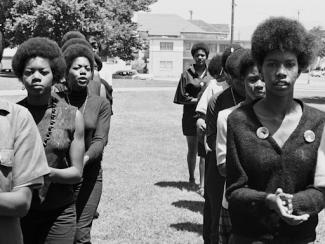
At the Black Panther Party’s peak, at least 60% of its membership was Black women. Many held leadership positions. All held the party down with the day-to-day tasks. We benefit from their work today.
Black women ran most programs out of the party’s offices, like the Free Breakfast for Children and Free Ambulance programs. They worked hard to provide housing, healthcare, food, and education.
Black women also wrote and created art for the newspaper, which had a worldwide audience. They founded chapters. They protested. They advocated for reproductive rights, many identifying with “Black Power Feminism,” critically operating from the intersection of race and gender.
So, where’s all this in the history books?
The erasure of Black women in justice movements does not represent our history or our present. Former Panthers are still fighting to honor women’s contributions.
One example: Ericka Huggins’ 2022 book, Comrade Sisters: Women of the Black Panther Party. It includes 100 photographs and 50 interviews focusing not on the well-known names but the everyday women most don’t know. It’s the first of its kind.
Black women had to battle misogyny within the party, and from the world. Their contributions are still unacknowledged.
But there’s an endless well of history for us to learn from and celebrate. And projects like Huggins’ mean we can change the narrative before this erasure continues into our future.